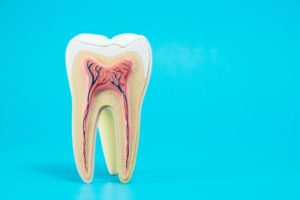Do Root Canals Actually Hurt?
August 21, 2020

These days, there is a lot of misinformation about root canals. Simply searching for this term online will yield several myths, such as root canals being painful or making you more likely to get cancer. In actuality, most of the scary things you read about root canal therapy are just rumors. Let’s address the most common of these misconceptions by talking about how getting a root canal in Richardson shouldn’t hurt.
What Is Root Canal Therapy?
The innermost portion of your tooth, called the pulp, consists of soft tissue containing blood vessels and nerves. When decay or damage reaches the pulp, root canal therapy must be performed. Otherwise, the tooth will have to be extracted to prevent the infection from spreading to your other teeth.
During root canal therapy, your mouth is numbed with a local anesthetic, and the pulp is removed. The inside of the tooth is thoroughly sanitized, and the pulp is replaced with a synthetic material to retain the tooth’s shape. Lastly, a permanent filling or dental crown is placed on top of the tooth to protect it from further damage.
Root Canals Are Designed to Treat Pain
Since the pulp contains sensitive nerves, an infection deep within the tooth can cause the mother of all toothaches. Root canal therapy removes the pulp, along with the nerves inside of it. Because of this, root canals actually relieve pain instead of causing it.
The pain commonly associated with root canals most likely comes from the often-excruciating toothache that necessitates this treatment. However, because your dentist will numb your tooth before beginning a root canal, you shouldn’t experience pain during your procedure.
Will There Be Pain After a Root Canal?
Although the root canal itself shouldn’t hurt, it’s perfectly normal to experience some discomfort for a few days afterward, particularly if there was an infection in the tooth. Your dentist may prescribe pain medication or recommend over-the-counter pain relievers to take at home. Be sure to take them as directed. Holding a cold compress to your cheek can minimize pain as well as swelling. It may also help to avoid chewing directly with the treated tooth until your final restoration has been placed.
If your discomfort doesn’t subside within a week, or your previous toothache returns several weeks or even months later, contact your dentist right away. It might be a sign of a new infection that should be promptly treated.
The idea that root canals are painful is just a myth. In fact, they’re a fairly common treatment for severe toothaches. If your dentist says you need a root canal, there’s nothing to be afraid of!
About the Author
Dr. Javier Ortiz is an endodontist at EPO Dental Specialists in Richardson, TX. This means that in addition to achieving his Doctor of Dental Medicine degree from the University of Puerto Rico, he completed his specialty training in endodontics (treatment of the inside of the tooth) at the Boston University Goldman School of Dental Medicine. Because Dr. Ortiz is currently board-eligible with the American Board of Endodontics, he is more than qualified to painlessly perform root canals and relieve your toothache. To learn more about why root canals are nothing to fear, visit his website or call (972) 479-1200.
No Comments
No comments yet.
RSS feed for comments on this post.
Sorry, the comment form is closed at this time.
